Reflective Approaches in Implementing Person-Centred Care Report
VerifiedAdded on 2023/01/12
|14
|4315
|69
Report
AI Summary
This report comprehensively examines person-centred care within healthcare settings, emphasizing the implementation of holistic approaches to patient care. It delves into the processes of promoting these approaches, including empowerment and the application of medical and social models in treating various conditions. The report also explores the adoption of person-centred approaches in program planning, addressing challenges like communication barriers and the involvement of patient relatives. Furthermore, it analyzes the reflection of different legislations, such as the Safe Care and Treatment guidelines and the Health and Social Care Act 2012, in providing person-centred care. The report identifies and proposes solutions to problems that arise when implementing regulations and policies. It includes a comparative reflective account of person-centred care in workplace settings, and outlines short, medium, and long-term plans for improving practice and skills, as well as contributions to workplace team effectiveness. The report concludes with a focus on staff training and organizational culture to promote person-centered care.
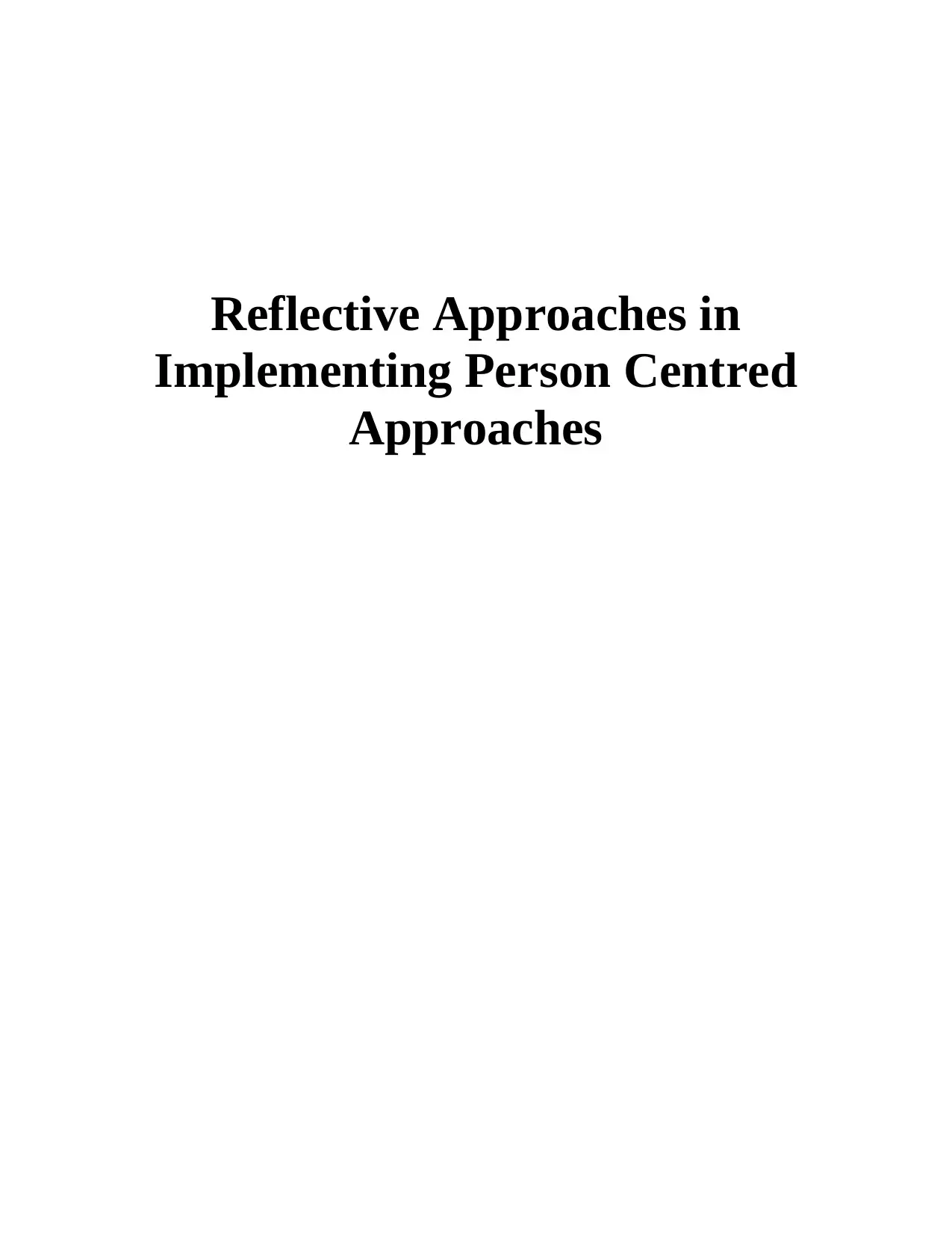
Reflective Approaches in
Implementing Person Centred
Approaches
Implementing Person Centred
Approaches
Paraphrase This Document
Need a fresh take? Get an instant paraphrase of this document with our AI Paraphraser
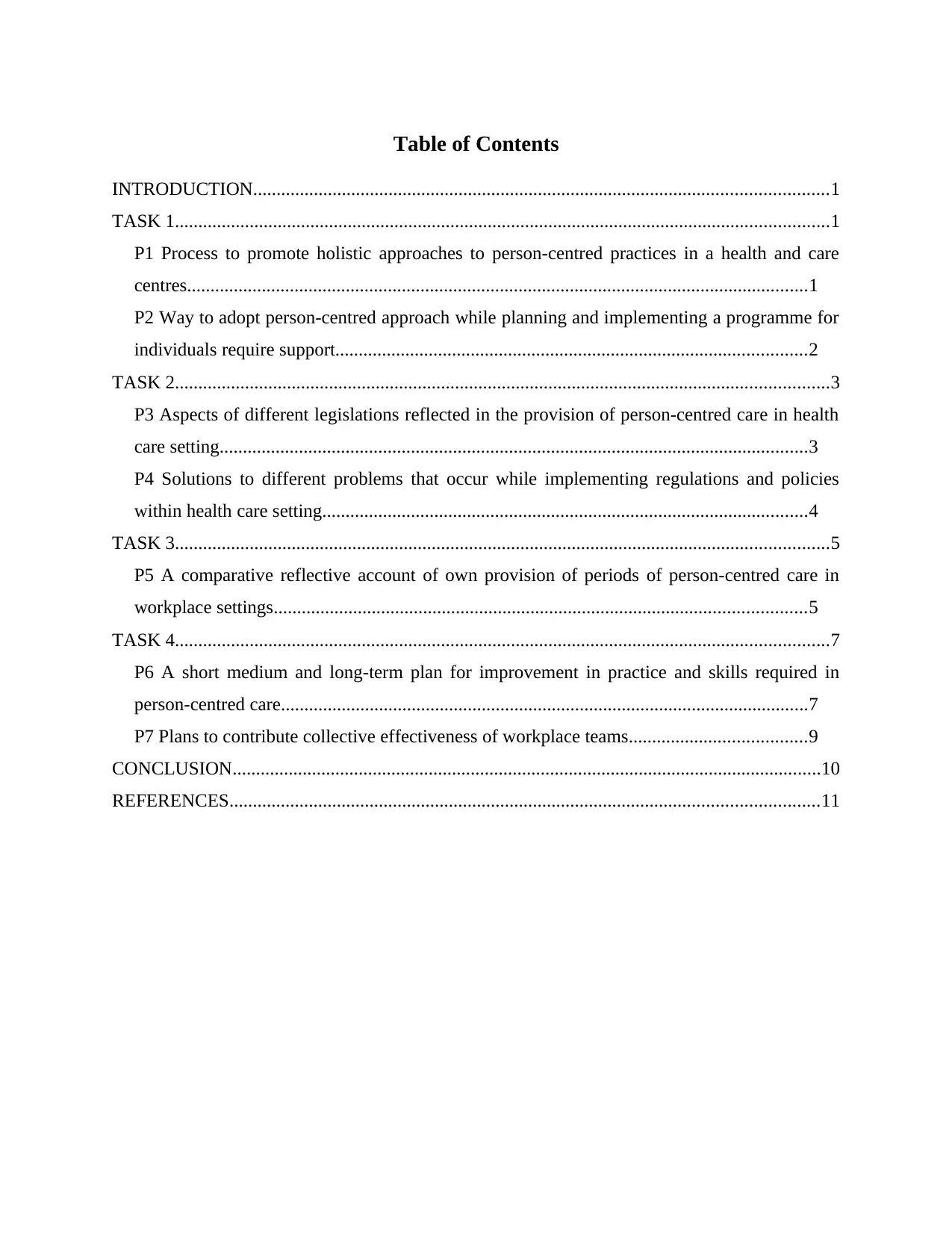
Table of Contents
INTRODUCTION...........................................................................................................................1
TASK 1............................................................................................................................................1
P1 Process to promote holistic approaches to person-centred practices in a health and care
centres.....................................................................................................................................1
P2 Way to adopt person-centred approach while planning and implementing a programme for
individuals require support.....................................................................................................2
TASK 2............................................................................................................................................3
P3 Aspects of different legislations reflected in the provision of person-centred care in health
care setting..............................................................................................................................3
P4 Solutions to different problems that occur while implementing regulations and policies
within health care setting........................................................................................................4
TASK 3............................................................................................................................................5
P5 A comparative reflective account of own provision of periods of person-centred care in
workplace settings..................................................................................................................5
TASK 4............................................................................................................................................7
P6 A short medium and long-term plan for improvement in practice and skills required in
person-centred care.................................................................................................................7
P7 Plans to contribute collective effectiveness of workplace teams......................................9
CONCLUSION..............................................................................................................................10
REFERENCES..............................................................................................................................11
INTRODUCTION...........................................................................................................................1
TASK 1............................................................................................................................................1
P1 Process to promote holistic approaches to person-centred practices in a health and care
centres.....................................................................................................................................1
P2 Way to adopt person-centred approach while planning and implementing a programme for
individuals require support.....................................................................................................2
TASK 2............................................................................................................................................3
P3 Aspects of different legislations reflected in the provision of person-centred care in health
care setting..............................................................................................................................3
P4 Solutions to different problems that occur while implementing regulations and policies
within health care setting........................................................................................................4
TASK 3............................................................................................................................................5
P5 A comparative reflective account of own provision of periods of person-centred care in
workplace settings..................................................................................................................5
TASK 4............................................................................................................................................7
P6 A short medium and long-term plan for improvement in practice and skills required in
person-centred care.................................................................................................................7
P7 Plans to contribute collective effectiveness of workplace teams......................................9
CONCLUSION..............................................................................................................................10
REFERENCES..............................................................................................................................11
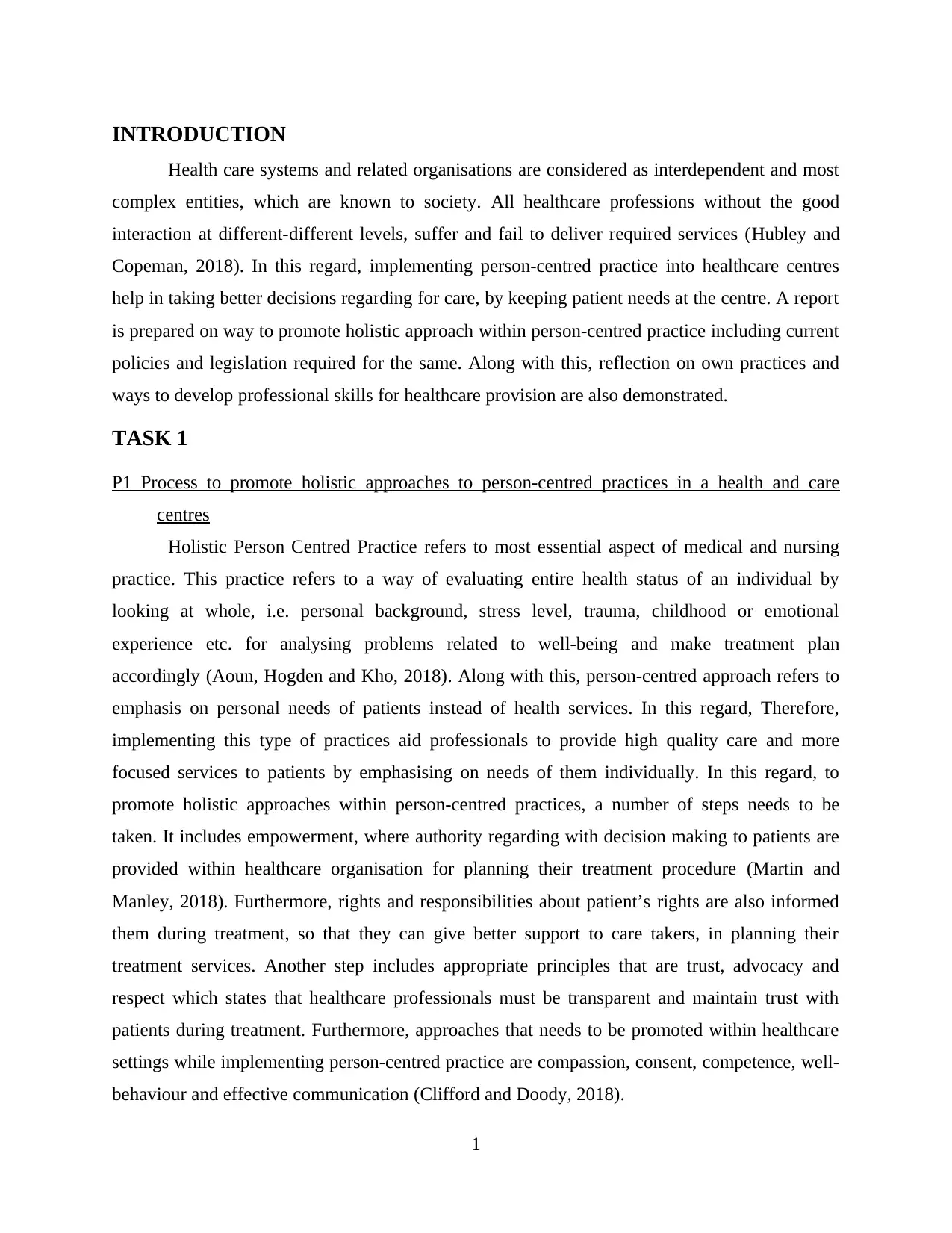
INTRODUCTION
Health care systems and related organisations are considered as interdependent and most
complex entities, which are known to society. All healthcare professions without the good
interaction at different-different levels, suffer and fail to deliver required services (Hubley and
Copeman, 2018). In this regard, implementing person-centred practice into healthcare centres
help in taking better decisions regarding for care, by keeping patient needs at the centre. A report
is prepared on way to promote holistic approach within person-centred practice including current
policies and legislation required for the same. Along with this, reflection on own practices and
ways to develop professional skills for healthcare provision are also demonstrated.
TASK 1
P1 Process to promote holistic approaches to person-centred practices in a health and care
centres
Holistic Person Centred Practice refers to most essential aspect of medical and nursing
practice. This practice refers to a way of evaluating entire health status of an individual by
looking at whole, i.e. personal background, stress level, trauma, childhood or emotional
experience etc. for analysing problems related to well-being and make treatment plan
accordingly (Aoun, Hogden and Kho, 2018). Along with this, person-centred approach refers to
emphasis on personal needs of patients instead of health services. In this regard, Therefore,
implementing this type of practices aid professionals to provide high quality care and more
focused services to patients by emphasising on needs of them individually. In this regard, to
promote holistic approaches within person-centred practices, a number of steps needs to be
taken. It includes empowerment, where authority regarding with decision making to patients are
provided within healthcare organisation for planning their treatment procedure (Martin and
Manley, 2018). Furthermore, rights and responsibilities about patient’s rights are also informed
them during treatment, so that they can give better support to care takers, in planning their
treatment services. Another step includes appropriate principles that are trust, advocacy and
respect which states that healthcare professionals must be transparent and maintain trust with
patients during treatment. Furthermore, approaches that needs to be promoted within healthcare
settings while implementing person-centred practice are compassion, consent, competence, well-
behaviour and effective communication (Clifford and Doody, 2018).
1
Health care systems and related organisations are considered as interdependent and most
complex entities, which are known to society. All healthcare professions without the good
interaction at different-different levels, suffer and fail to deliver required services (Hubley and
Copeman, 2018). In this regard, implementing person-centred practice into healthcare centres
help in taking better decisions regarding for care, by keeping patient needs at the centre. A report
is prepared on way to promote holistic approach within person-centred practice including current
policies and legislation required for the same. Along with this, reflection on own practices and
ways to develop professional skills for healthcare provision are also demonstrated.
TASK 1
P1 Process to promote holistic approaches to person-centred practices in a health and care
centres
Holistic Person Centred Practice refers to most essential aspect of medical and nursing
practice. This practice refers to a way of evaluating entire health status of an individual by
looking at whole, i.e. personal background, stress level, trauma, childhood or emotional
experience etc. for analysing problems related to well-being and make treatment plan
accordingly (Aoun, Hogden and Kho, 2018). Along with this, person-centred approach refers to
emphasis on personal needs of patients instead of health services. In this regard, Therefore,
implementing this type of practices aid professionals to provide high quality care and more
focused services to patients by emphasising on needs of them individually. In this regard, to
promote holistic approaches within person-centred practices, a number of steps needs to be
taken. It includes empowerment, where authority regarding with decision making to patients are
provided within healthcare organisation for planning their treatment procedure (Martin and
Manley, 2018). Furthermore, rights and responsibilities about patient’s rights are also informed
them during treatment, so that they can give better support to care takers, in planning their
treatment services. Another step includes appropriate principles that are trust, advocacy and
respect which states that healthcare professionals must be transparent and maintain trust with
patients during treatment. Furthermore, approaches that needs to be promoted within healthcare
settings while implementing person-centred practice are compassion, consent, competence, well-
behaviour and effective communication (Clifford and Doody, 2018).
1
⊘ This is a preview!⊘
Do you want full access?
Subscribe today to unlock all pages.

Trusted by 1+ million students worldwide
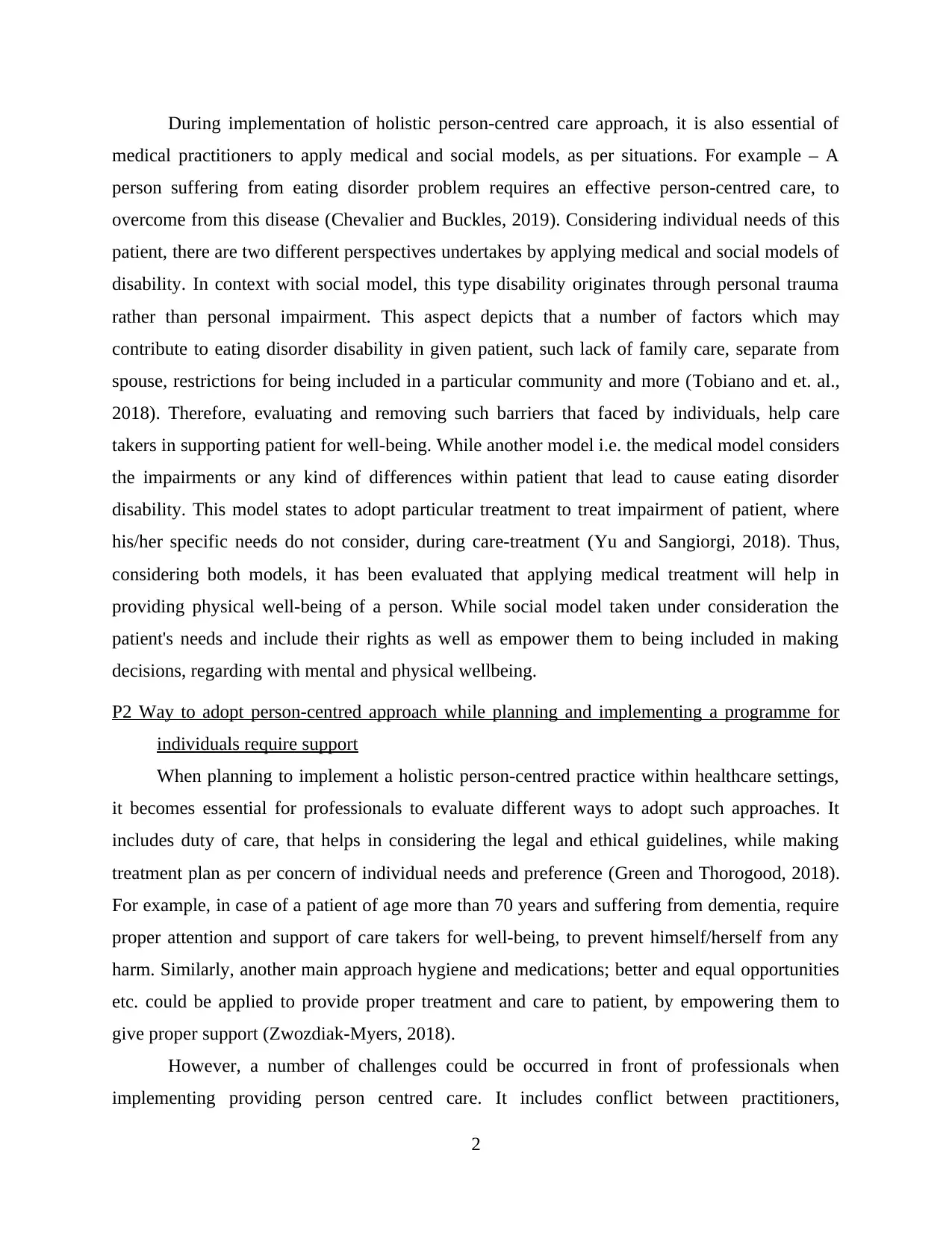
During implementation of holistic person-centred care approach, it is also essential of
medical practitioners to apply medical and social models, as per situations. For example – A
person suffering from eating disorder problem requires an effective person-centred care, to
overcome from this disease (Chevalier and Buckles, 2019). Considering individual needs of this
patient, there are two different perspectives undertakes by applying medical and social models of
disability. In context with social model, this type disability originates through personal trauma
rather than personal impairment. This aspect depicts that a number of factors which may
contribute to eating disorder disability in given patient, such lack of family care, separate from
spouse, restrictions for being included in a particular community and more (Tobiano and et. al.,
2018). Therefore, evaluating and removing such barriers that faced by individuals, help care
takers in supporting patient for well-being. While another model i.e. the medical model considers
the impairments or any kind of differences within patient that lead to cause eating disorder
disability. This model states to adopt particular treatment to treat impairment of patient, where
his/her specific needs do not consider, during care-treatment (Yu and Sangiorgi, 2018). Thus,
considering both models, it has been evaluated that applying medical treatment will help in
providing physical well-being of a person. While social model taken under consideration the
patient's needs and include their rights as well as empower them to being included in making
decisions, regarding with mental and physical wellbeing.
P2 Way to adopt person-centred approach while planning and implementing a programme for
individuals require support
When planning to implement a holistic person-centred practice within healthcare settings,
it becomes essential for professionals to evaluate different ways to adopt such approaches. It
includes duty of care, that helps in considering the legal and ethical guidelines, while making
treatment plan as per concern of individual needs and preference (Green and Thorogood, 2018).
For example, in case of a patient of age more than 70 years and suffering from dementia, require
proper attention and support of care takers for well-being, to prevent himself/herself from any
harm. Similarly, another main approach hygiene and medications; better and equal opportunities
etc. could be applied to provide proper treatment and care to patient, by empowering them to
give proper support (Zwozdiak-Myers, 2018).
However, a number of challenges could be occurred in front of professionals when
implementing providing person centred care. It includes conflict between practitioners,
2
medical practitioners to apply medical and social models, as per situations. For example – A
person suffering from eating disorder problem requires an effective person-centred care, to
overcome from this disease (Chevalier and Buckles, 2019). Considering individual needs of this
patient, there are two different perspectives undertakes by applying medical and social models of
disability. In context with social model, this type disability originates through personal trauma
rather than personal impairment. This aspect depicts that a number of factors which may
contribute to eating disorder disability in given patient, such lack of family care, separate from
spouse, restrictions for being included in a particular community and more (Tobiano and et. al.,
2018). Therefore, evaluating and removing such barriers that faced by individuals, help care
takers in supporting patient for well-being. While another model i.e. the medical model considers
the impairments or any kind of differences within patient that lead to cause eating disorder
disability. This model states to adopt particular treatment to treat impairment of patient, where
his/her specific needs do not consider, during care-treatment (Yu and Sangiorgi, 2018). Thus,
considering both models, it has been evaluated that applying medical treatment will help in
providing physical well-being of a person. While social model taken under consideration the
patient's needs and include their rights as well as empower them to being included in making
decisions, regarding with mental and physical wellbeing.
P2 Way to adopt person-centred approach while planning and implementing a programme for
individuals require support
When planning to implement a holistic person-centred practice within healthcare settings,
it becomes essential for professionals to evaluate different ways to adopt such approaches. It
includes duty of care, that helps in considering the legal and ethical guidelines, while making
treatment plan as per concern of individual needs and preference (Green and Thorogood, 2018).
For example, in case of a patient of age more than 70 years and suffering from dementia, require
proper attention and support of care takers for well-being, to prevent himself/herself from any
harm. Similarly, another main approach hygiene and medications; better and equal opportunities
etc. could be applied to provide proper treatment and care to patient, by empowering them to
give proper support (Zwozdiak-Myers, 2018).
However, a number of challenges could be occurred in front of professionals when
implementing providing person centred care. It includes conflict between practitioners,
2
Paraphrase This Document
Need a fresh take? Get an instant paraphrase of this document with our AI Paraphraser
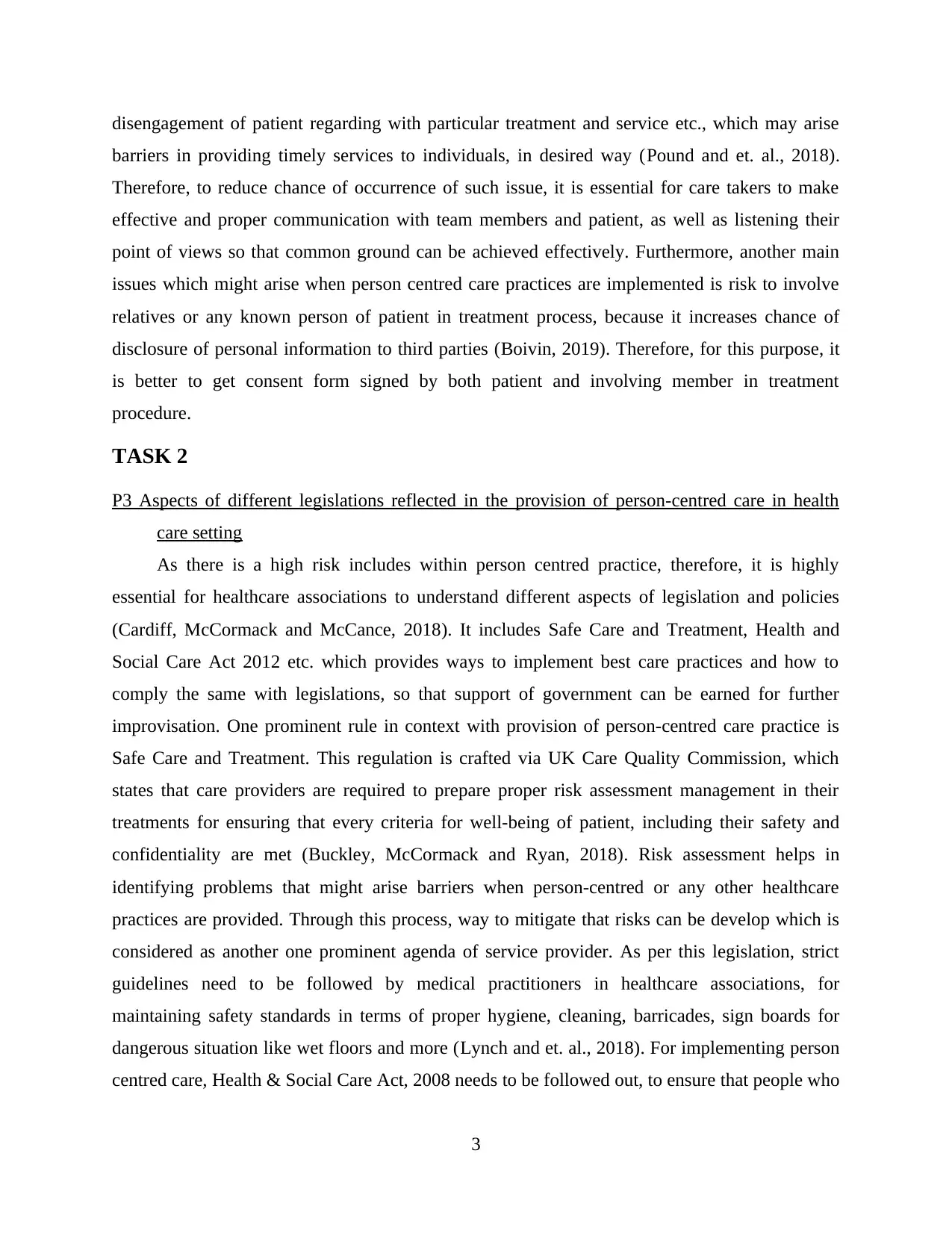
disengagement of patient regarding with particular treatment and service etc., which may arise
barriers in providing timely services to individuals, in desired way (Pound and et. al., 2018).
Therefore, to reduce chance of occurrence of such issue, it is essential for care takers to make
effective and proper communication with team members and patient, as well as listening their
point of views so that common ground can be achieved effectively. Furthermore, another main
issues which might arise when person centred care practices are implemented is risk to involve
relatives or any known person of patient in treatment process, because it increases chance of
disclosure of personal information to third parties (Boivin, 2019). Therefore, for this purpose, it
is better to get consent form signed by both patient and involving member in treatment
procedure.
TASK 2
P3 Aspects of different legislations reflected in the provision of person-centred care in health
care setting
As there is a high risk includes within person centred practice, therefore, it is highly
essential for healthcare associations to understand different aspects of legislation and policies
(Cardiff, McCormack and McCance, 2018). It includes Safe Care and Treatment, Health and
Social Care Act 2012 etc. which provides ways to implement best care practices and how to
comply the same with legislations, so that support of government can be earned for further
improvisation. One prominent rule in context with provision of person-centred care practice is
Safe Care and Treatment. This regulation is crafted via UK Care Quality Commission, which
states that care providers are required to prepare proper risk assessment management in their
treatments for ensuring that every criteria for well-being of patient, including their safety and
confidentiality are met (Buckley, McCormack and Ryan, 2018). Risk assessment helps in
identifying problems that might arise barriers when person-centred or any other healthcare
practices are provided. Through this process, way to mitigate that risks can be develop which is
considered as another one prominent agenda of service provider. As per this legislation, strict
guidelines need to be followed by medical practitioners in healthcare associations, for
maintaining safety standards in terms of proper hygiene, cleaning, barricades, sign boards for
dangerous situation like wet floors and more (Lynch and et. al., 2018). For implementing person
centred care, Health & Social Care Act, 2008 needs to be followed out, to ensure that people who
3
barriers in providing timely services to individuals, in desired way (Pound and et. al., 2018).
Therefore, to reduce chance of occurrence of such issue, it is essential for care takers to make
effective and proper communication with team members and patient, as well as listening their
point of views so that common ground can be achieved effectively. Furthermore, another main
issues which might arise when person centred care practices are implemented is risk to involve
relatives or any known person of patient in treatment process, because it increases chance of
disclosure of personal information to third parties (Boivin, 2019). Therefore, for this purpose, it
is better to get consent form signed by both patient and involving member in treatment
procedure.
TASK 2
P3 Aspects of different legislations reflected in the provision of person-centred care in health
care setting
As there is a high risk includes within person centred practice, therefore, it is highly
essential for healthcare associations to understand different aspects of legislation and policies
(Cardiff, McCormack and McCance, 2018). It includes Safe Care and Treatment, Health and
Social Care Act 2012 etc. which provides ways to implement best care practices and how to
comply the same with legislations, so that support of government can be earned for further
improvisation. One prominent rule in context with provision of person-centred care practice is
Safe Care and Treatment. This regulation is crafted via UK Care Quality Commission, which
states that care providers are required to prepare proper risk assessment management in their
treatments for ensuring that every criteria for well-being of patient, including their safety and
confidentiality are met (Buckley, McCormack and Ryan, 2018). Risk assessment helps in
identifying problems that might arise barriers when person-centred or any other healthcare
practices are provided. Through this process, way to mitigate that risks can be develop which is
considered as another one prominent agenda of service provider. As per this legislation, strict
guidelines need to be followed by medical practitioners in healthcare associations, for
maintaining safety standards in terms of proper hygiene, cleaning, barricades, sign boards for
dangerous situation like wet floors and more (Lynch and et. al., 2018). For implementing person
centred care, Health & Social Care Act, 2008 needs to be followed out, to ensure that people who
3
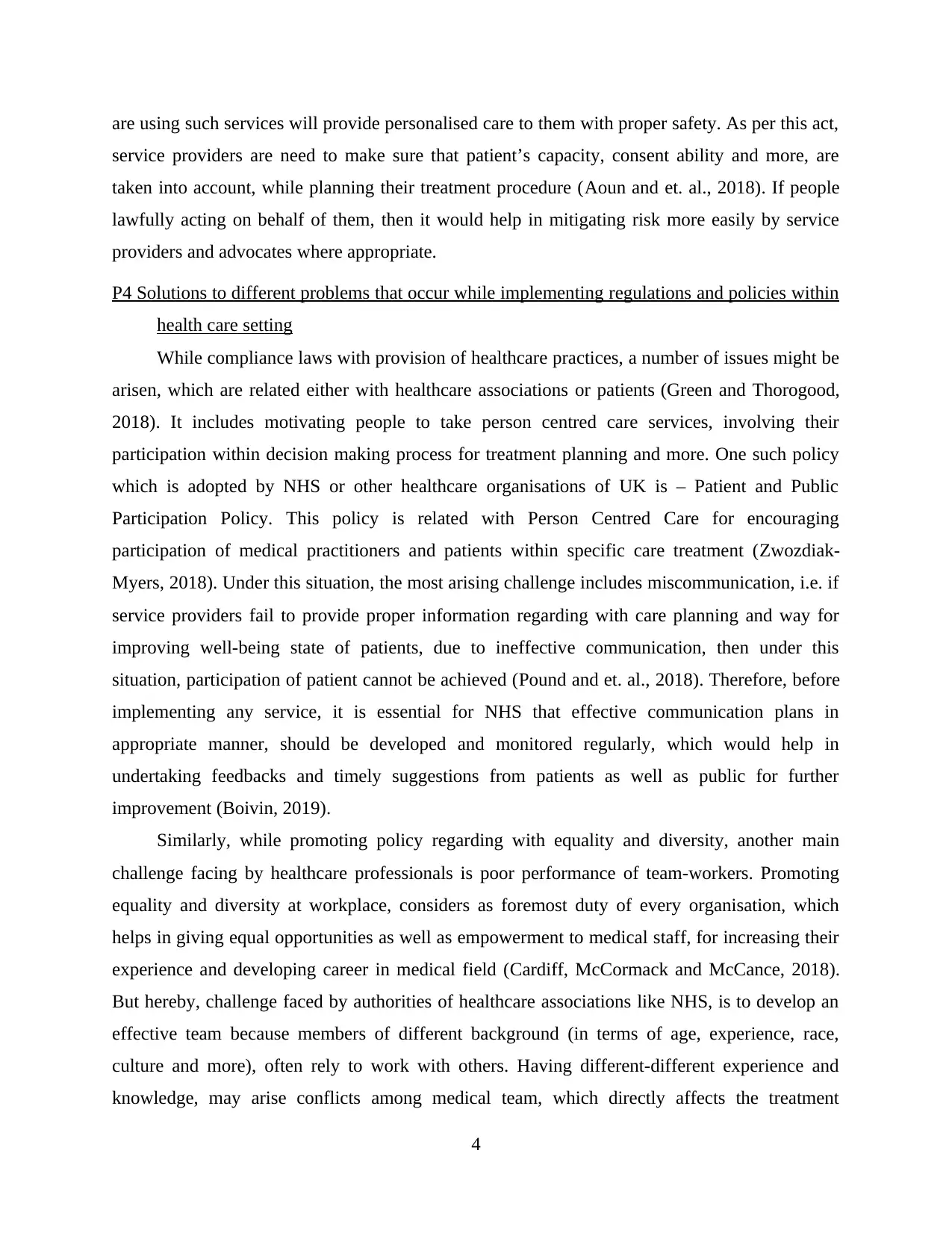
are using such services will provide personalised care to them with proper safety. As per this act,
service providers are need to make sure that patient’s capacity, consent ability and more, are
taken into account, while planning their treatment procedure (Aoun and et. al., 2018). If people
lawfully acting on behalf of them, then it would help in mitigating risk more easily by service
providers and advocates where appropriate.
P4 Solutions to different problems that occur while implementing regulations and policies within
health care setting
While compliance laws with provision of healthcare practices, a number of issues might be
arisen, which are related either with healthcare associations or patients (Green and Thorogood,
2018). It includes motivating people to take person centred care services, involving their
participation within decision making process for treatment planning and more. One such policy
which is adopted by NHS or other healthcare organisations of UK is – Patient and Public
Participation Policy. This policy is related with Person Centred Care for encouraging
participation of medical practitioners and patients within specific care treatment (Zwozdiak-
Myers, 2018). Under this situation, the most arising challenge includes miscommunication, i.e. if
service providers fail to provide proper information regarding with care planning and way for
improving well-being state of patients, due to ineffective communication, then under this
situation, participation of patient cannot be achieved (Pound and et. al., 2018). Therefore, before
implementing any service, it is essential for NHS that effective communication plans in
appropriate manner, should be developed and monitored regularly, which would help in
undertaking feedbacks and timely suggestions from patients as well as public for further
improvement (Boivin, 2019).
Similarly, while promoting policy regarding with equality and diversity, another main
challenge facing by healthcare professionals is poor performance of team-workers. Promoting
equality and diversity at workplace, considers as foremost duty of every organisation, which
helps in giving equal opportunities as well as empowerment to medical staff, for increasing their
experience and developing career in medical field (Cardiff, McCormack and McCance, 2018).
But hereby, challenge faced by authorities of healthcare associations like NHS, is to develop an
effective team because members of different background (in terms of age, experience, race,
culture and more), often rely to work with others. Having different-different experience and
knowledge, may arise conflicts among medical team, which directly affects the treatment
4
service providers are need to make sure that patient’s capacity, consent ability and more, are
taken into account, while planning their treatment procedure (Aoun and et. al., 2018). If people
lawfully acting on behalf of them, then it would help in mitigating risk more easily by service
providers and advocates where appropriate.
P4 Solutions to different problems that occur while implementing regulations and policies within
health care setting
While compliance laws with provision of healthcare practices, a number of issues might be
arisen, which are related either with healthcare associations or patients (Green and Thorogood,
2018). It includes motivating people to take person centred care services, involving their
participation within decision making process for treatment planning and more. One such policy
which is adopted by NHS or other healthcare organisations of UK is – Patient and Public
Participation Policy. This policy is related with Person Centred Care for encouraging
participation of medical practitioners and patients within specific care treatment (Zwozdiak-
Myers, 2018). Under this situation, the most arising challenge includes miscommunication, i.e. if
service providers fail to provide proper information regarding with care planning and way for
improving well-being state of patients, due to ineffective communication, then under this
situation, participation of patient cannot be achieved (Pound and et. al., 2018). Therefore, before
implementing any service, it is essential for NHS that effective communication plans in
appropriate manner, should be developed and monitored regularly, which would help in
undertaking feedbacks and timely suggestions from patients as well as public for further
improvement (Boivin, 2019).
Similarly, while promoting policy regarding with equality and diversity, another main
challenge facing by healthcare professionals is poor performance of team-workers. Promoting
equality and diversity at workplace, considers as foremost duty of every organisation, which
helps in giving equal opportunities as well as empowerment to medical staff, for increasing their
experience and developing career in medical field (Cardiff, McCormack and McCance, 2018).
But hereby, challenge faced by authorities of healthcare associations like NHS, is to develop an
effective team because members of different background (in terms of age, experience, race,
culture and more), often rely to work with others. Having different-different experience and
knowledge, may arise conflicts among medical team, which directly affects the treatment
4
⊘ This is a preview!⊘
Do you want full access?
Subscribe today to unlock all pages.

Trusted by 1+ million students worldwide
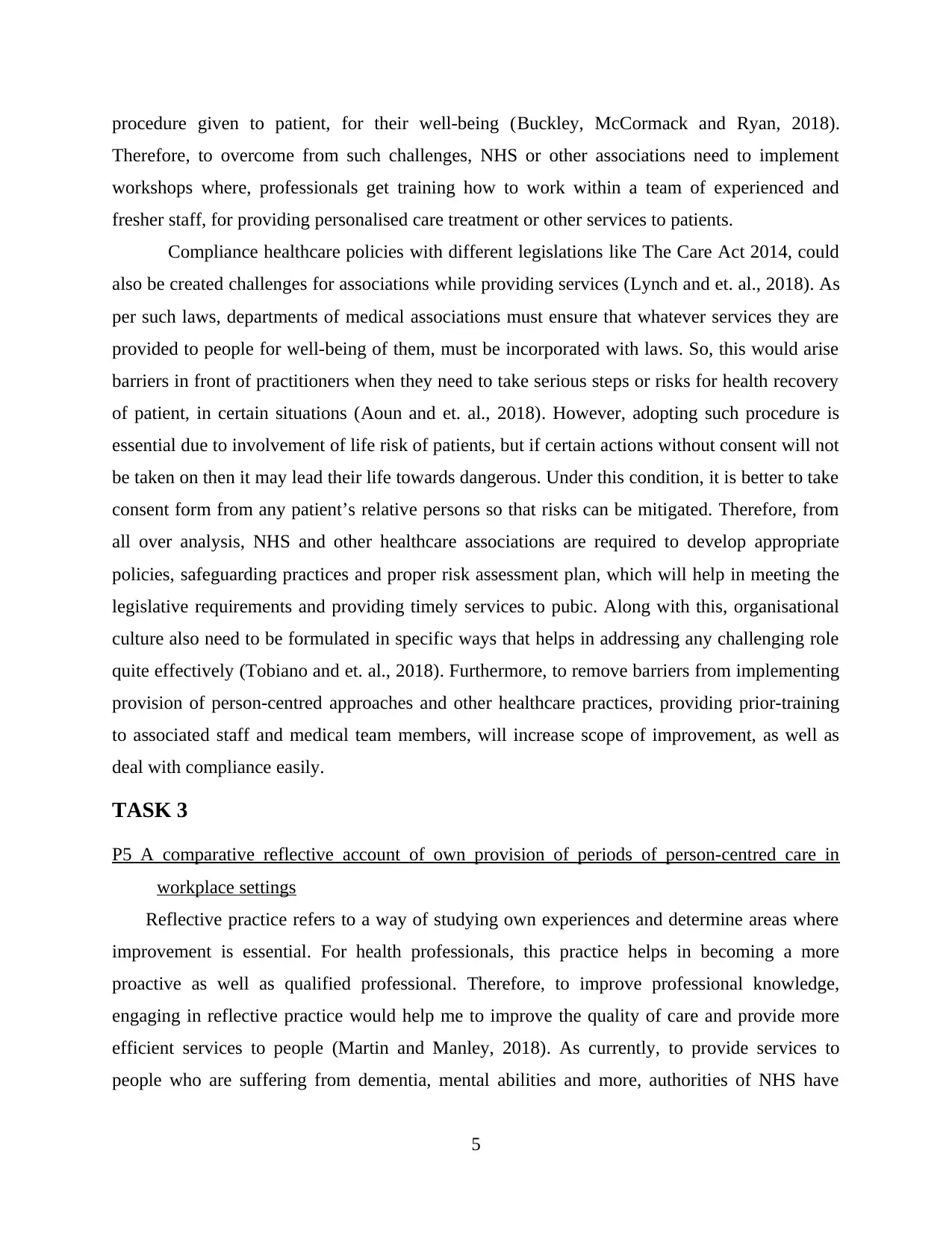
procedure given to patient, for their well-being (Buckley, McCormack and Ryan, 2018).
Therefore, to overcome from such challenges, NHS or other associations need to implement
workshops where, professionals get training how to work within a team of experienced and
fresher staff, for providing personalised care treatment or other services to patients.
Compliance healthcare policies with different legislations like The Care Act 2014, could
also be created challenges for associations while providing services (Lynch and et. al., 2018). As
per such laws, departments of medical associations must ensure that whatever services they are
provided to people for well-being of them, must be incorporated with laws. So, this would arise
barriers in front of practitioners when they need to take serious steps or risks for health recovery
of patient, in certain situations (Aoun and et. al., 2018). However, adopting such procedure is
essential due to involvement of life risk of patients, but if certain actions without consent will not
be taken on then it may lead their life towards dangerous. Under this condition, it is better to take
consent form from any patient’s relative persons so that risks can be mitigated. Therefore, from
all over analysis, NHS and other healthcare associations are required to develop appropriate
policies, safeguarding practices and proper risk assessment plan, which will help in meeting the
legislative requirements and providing timely services to pubic. Along with this, organisational
culture also need to be formulated in specific ways that helps in addressing any challenging role
quite effectively (Tobiano and et. al., 2018). Furthermore, to remove barriers from implementing
provision of person-centred approaches and other healthcare practices, providing prior-training
to associated staff and medical team members, will increase scope of improvement, as well as
deal with compliance easily.
TASK 3
P5 A comparative reflective account of own provision of periods of person-centred care in
workplace settings
Reflective practice refers to a way of studying own experiences and determine areas where
improvement is essential. For health professionals, this practice helps in becoming a more
proactive as well as qualified professional. Therefore, to improve professional knowledge,
engaging in reflective practice would help me to improve the quality of care and provide more
efficient services to people (Martin and Manley, 2018). As currently, to provide services to
people who are suffering from dementia, mental abilities and more, authorities of NHS have
5
Therefore, to overcome from such challenges, NHS or other associations need to implement
workshops where, professionals get training how to work within a team of experienced and
fresher staff, for providing personalised care treatment or other services to patients.
Compliance healthcare policies with different legislations like The Care Act 2014, could
also be created challenges for associations while providing services (Lynch and et. al., 2018). As
per such laws, departments of medical associations must ensure that whatever services they are
provided to people for well-being of them, must be incorporated with laws. So, this would arise
barriers in front of practitioners when they need to take serious steps or risks for health recovery
of patient, in certain situations (Aoun and et. al., 2018). However, adopting such procedure is
essential due to involvement of life risk of patients, but if certain actions without consent will not
be taken on then it may lead their life towards dangerous. Under this condition, it is better to take
consent form from any patient’s relative persons so that risks can be mitigated. Therefore, from
all over analysis, NHS and other healthcare associations are required to develop appropriate
policies, safeguarding practices and proper risk assessment plan, which will help in meeting the
legislative requirements and providing timely services to pubic. Along with this, organisational
culture also need to be formulated in specific ways that helps in addressing any challenging role
quite effectively (Tobiano and et. al., 2018). Furthermore, to remove barriers from implementing
provision of person-centred approaches and other healthcare practices, providing prior-training
to associated staff and medical team members, will increase scope of improvement, as well as
deal with compliance easily.
TASK 3
P5 A comparative reflective account of own provision of periods of person-centred care in
workplace settings
Reflective practice refers to a way of studying own experiences and determine areas where
improvement is essential. For health professionals, this practice helps in becoming a more
proactive as well as qualified professional. Therefore, to improve professional knowledge,
engaging in reflective practice would help me to improve the quality of care and provide more
efficient services to people (Martin and Manley, 2018). As currently, to provide services to
people who are suffering from dementia, mental abilities and more, authorities of NHS have
5
Paraphrase This Document
Need a fresh take? Get an instant paraphrase of this document with our AI Paraphraser
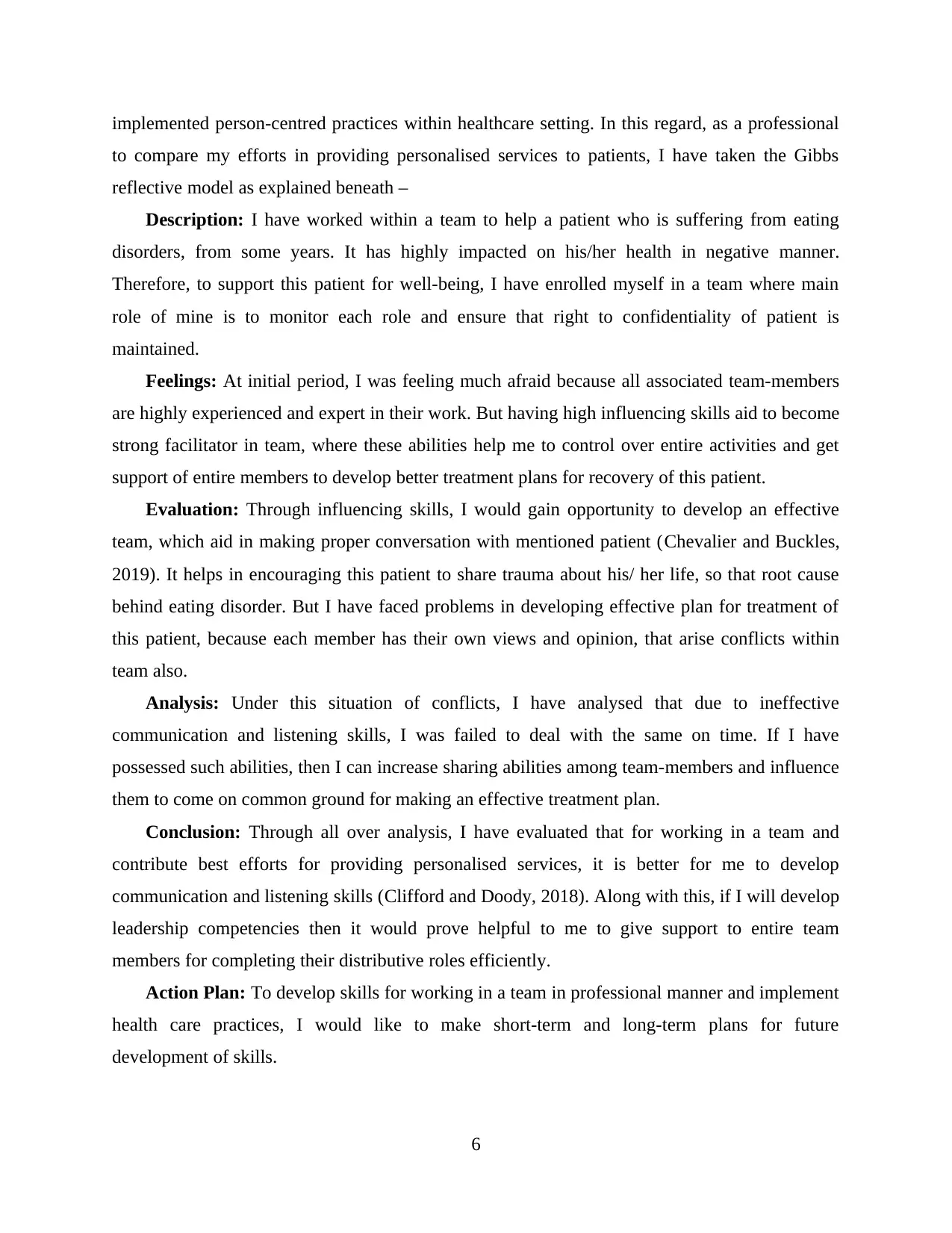
implemented person-centred practices within healthcare setting. In this regard, as a professional
to compare my efforts in providing personalised services to patients, I have taken the Gibbs
reflective model as explained beneath –
Description: I have worked within a team to help a patient who is suffering from eating
disorders, from some years. It has highly impacted on his/her health in negative manner.
Therefore, to support this patient for well-being, I have enrolled myself in a team where main
role of mine is to monitor each role and ensure that right to confidentiality of patient is
maintained.
Feelings: At initial period, I was feeling much afraid because all associated team-members
are highly experienced and expert in their work. But having high influencing skills aid to become
strong facilitator in team, where these abilities help me to control over entire activities and get
support of entire members to develop better treatment plans for recovery of this patient.
Evaluation: Through influencing skills, I would gain opportunity to develop an effective
team, which aid in making proper conversation with mentioned patient (Chevalier and Buckles,
2019). It helps in encouraging this patient to share trauma about his/ her life, so that root cause
behind eating disorder. But I have faced problems in developing effective plan for treatment of
this patient, because each member has their own views and opinion, that arise conflicts within
team also.
Analysis: Under this situation of conflicts, I have analysed that due to ineffective
communication and listening skills, I was failed to deal with the same on time. If I have
possessed such abilities, then I can increase sharing abilities among team-members and influence
them to come on common ground for making an effective treatment plan.
Conclusion: Through all over analysis, I have evaluated that for working in a team and
contribute best efforts for providing personalised services, it is better for me to develop
communication and listening skills (Clifford and Doody, 2018). Along with this, if I will develop
leadership competencies then it would prove helpful to me to give support to entire team
members for completing their distributive roles efficiently.
Action Plan: To develop skills for working in a team in professional manner and implement
health care practices, I would like to make short-term and long-term plans for future
development of skills.
6
to compare my efforts in providing personalised services to patients, I have taken the Gibbs
reflective model as explained beneath –
Description: I have worked within a team to help a patient who is suffering from eating
disorders, from some years. It has highly impacted on his/her health in negative manner.
Therefore, to support this patient for well-being, I have enrolled myself in a team where main
role of mine is to monitor each role and ensure that right to confidentiality of patient is
maintained.
Feelings: At initial period, I was feeling much afraid because all associated team-members
are highly experienced and expert in their work. But having high influencing skills aid to become
strong facilitator in team, where these abilities help me to control over entire activities and get
support of entire members to develop better treatment plans for recovery of this patient.
Evaluation: Through influencing skills, I would gain opportunity to develop an effective
team, which aid in making proper conversation with mentioned patient (Chevalier and Buckles,
2019). It helps in encouraging this patient to share trauma about his/ her life, so that root cause
behind eating disorder. But I have faced problems in developing effective plan for treatment of
this patient, because each member has their own views and opinion, that arise conflicts within
team also.
Analysis: Under this situation of conflicts, I have analysed that due to ineffective
communication and listening skills, I was failed to deal with the same on time. If I have
possessed such abilities, then I can increase sharing abilities among team-members and influence
them to come on common ground for making an effective treatment plan.
Conclusion: Through all over analysis, I have evaluated that for working in a team and
contribute best efforts for providing personalised services, it is better for me to develop
communication and listening skills (Clifford and Doody, 2018). Along with this, if I will develop
leadership competencies then it would prove helpful to me to give support to entire team
members for completing their distributive roles efficiently.
Action Plan: To develop skills for working in a team in professional manner and implement
health care practices, I would like to make short-term and long-term plans for future
development of skills.
6
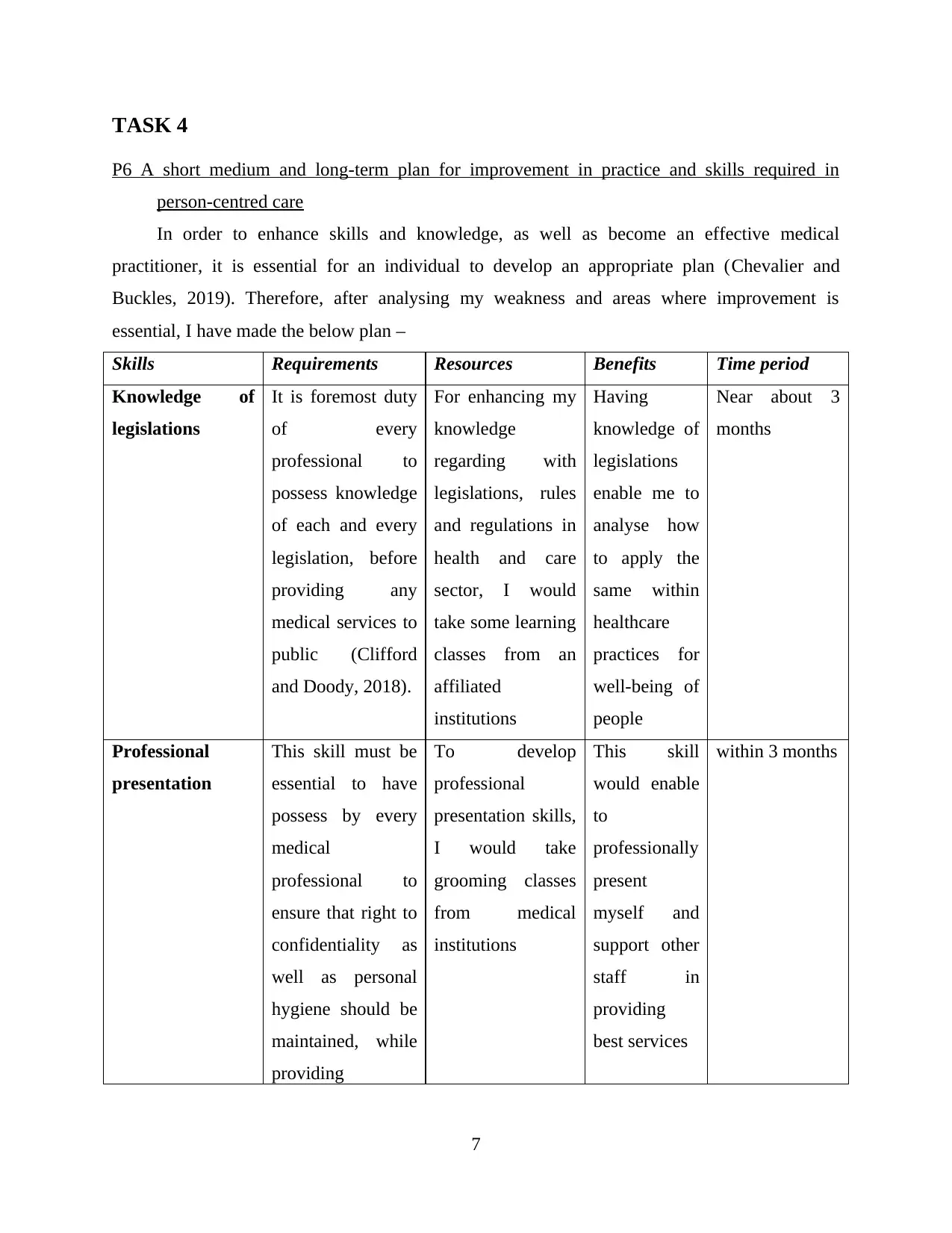
TASK 4
P6 A short medium and long-term plan for improvement in practice and skills required in
person-centred care
In order to enhance skills and knowledge, as well as become an effective medical
practitioner, it is essential for an individual to develop an appropriate plan (Chevalier and
Buckles, 2019). Therefore, after analysing my weakness and areas where improvement is
essential, I have made the below plan –
Skills Requirements Resources Benefits Time period
Knowledge of
legislations
It is foremost duty
of every
professional to
possess knowledge
of each and every
legislation, before
providing any
medical services to
public (Clifford
and Doody, 2018).
For enhancing my
knowledge
regarding with
legislations, rules
and regulations in
health and care
sector, I would
take some learning
classes from an
affiliated
institutions
Having
knowledge of
legislations
enable me to
analyse how
to apply the
same within
healthcare
practices for
well-being of
people
Near about 3
months
Professional
presentation
This skill must be
essential to have
possess by every
medical
professional to
ensure that right to
confidentiality as
well as personal
hygiene should be
maintained, while
providing
To develop
professional
presentation skills,
I would take
grooming classes
from medical
institutions
This skill
would enable
to
professionally
present
myself and
support other
staff in
providing
best services
within 3 months
7
P6 A short medium and long-term plan for improvement in practice and skills required in
person-centred care
In order to enhance skills and knowledge, as well as become an effective medical
practitioner, it is essential for an individual to develop an appropriate plan (Chevalier and
Buckles, 2019). Therefore, after analysing my weakness and areas where improvement is
essential, I have made the below plan –
Skills Requirements Resources Benefits Time period
Knowledge of
legislations
It is foremost duty
of every
professional to
possess knowledge
of each and every
legislation, before
providing any
medical services to
public (Clifford
and Doody, 2018).
For enhancing my
knowledge
regarding with
legislations, rules
and regulations in
health and care
sector, I would
take some learning
classes from an
affiliated
institutions
Having
knowledge of
legislations
enable me to
analyse how
to apply the
same within
healthcare
practices for
well-being of
people
Near about 3
months
Professional
presentation
This skill must be
essential to have
possess by every
medical
professional to
ensure that right to
confidentiality as
well as personal
hygiene should be
maintained, while
providing
To develop
professional
presentation skills,
I would take
grooming classes
from medical
institutions
This skill
would enable
to
professionally
present
myself and
support other
staff in
providing
best services
within 3 months
7
⊘ This is a preview!⊘
Do you want full access?
Subscribe today to unlock all pages.

Trusted by 1+ million students worldwide
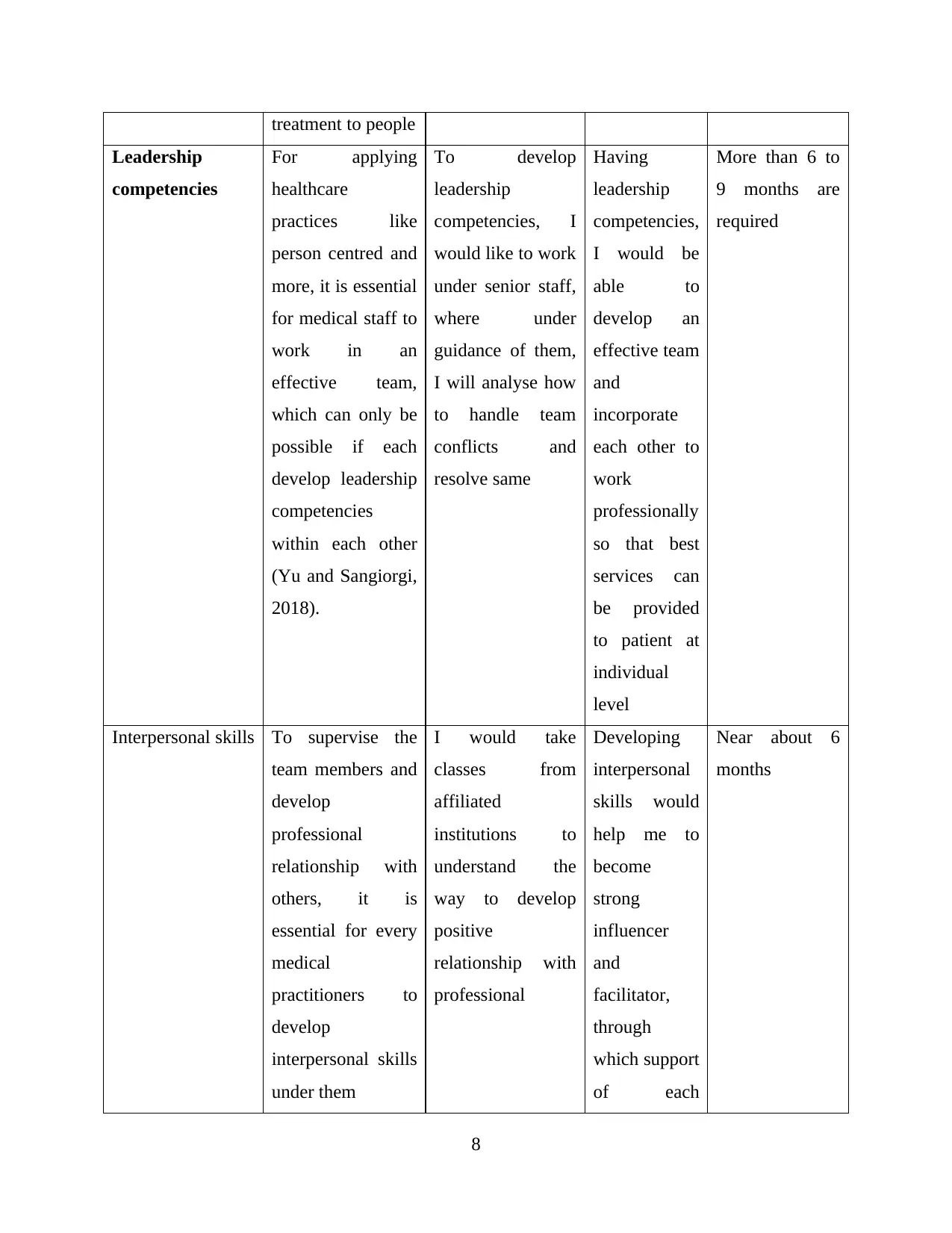
treatment to people
Leadership
competencies
For applying
healthcare
practices like
person centred and
more, it is essential
for medical staff to
work in an
effective team,
which can only be
possible if each
develop leadership
competencies
within each other
(Yu and Sangiorgi,
2018).
To develop
leadership
competencies, I
would like to work
under senior staff,
where under
guidance of them,
I will analyse how
to handle team
conflicts and
resolve same
Having
leadership
competencies,
I would be
able to
develop an
effective team
and
incorporate
each other to
work
professionally
so that best
services can
be provided
to patient at
individual
level
More than 6 to
9 months are
required
Interpersonal skills To supervise the
team members and
develop
professional
relationship with
others, it is
essential for every
medical
practitioners to
develop
interpersonal skills
under them
I would take
classes from
affiliated
institutions to
understand the
way to develop
positive
relationship with
professional
Developing
interpersonal
skills would
help me to
become
strong
influencer
and
facilitator,
through
which support
of each
Near about 6
months
8
Leadership
competencies
For applying
healthcare
practices like
person centred and
more, it is essential
for medical staff to
work in an
effective team,
which can only be
possible if each
develop leadership
competencies
within each other
(Yu and Sangiorgi,
2018).
To develop
leadership
competencies, I
would like to work
under senior staff,
where under
guidance of them,
I will analyse how
to handle team
conflicts and
resolve same
Having
leadership
competencies,
I would be
able to
develop an
effective team
and
incorporate
each other to
work
professionally
so that best
services can
be provided
to patient at
individual
level
More than 6 to
9 months are
required
Interpersonal skills To supervise the
team members and
develop
professional
relationship with
others, it is
essential for every
medical
practitioners to
develop
interpersonal skills
under them
I would take
classes from
affiliated
institutions to
understand the
way to develop
positive
relationship with
professional
Developing
interpersonal
skills would
help me to
become
strong
influencer
and
facilitator,
through
which support
of each
Near about 6
months
8
Paraphrase This Document
Need a fresh take? Get an instant paraphrase of this document with our AI Paraphraser
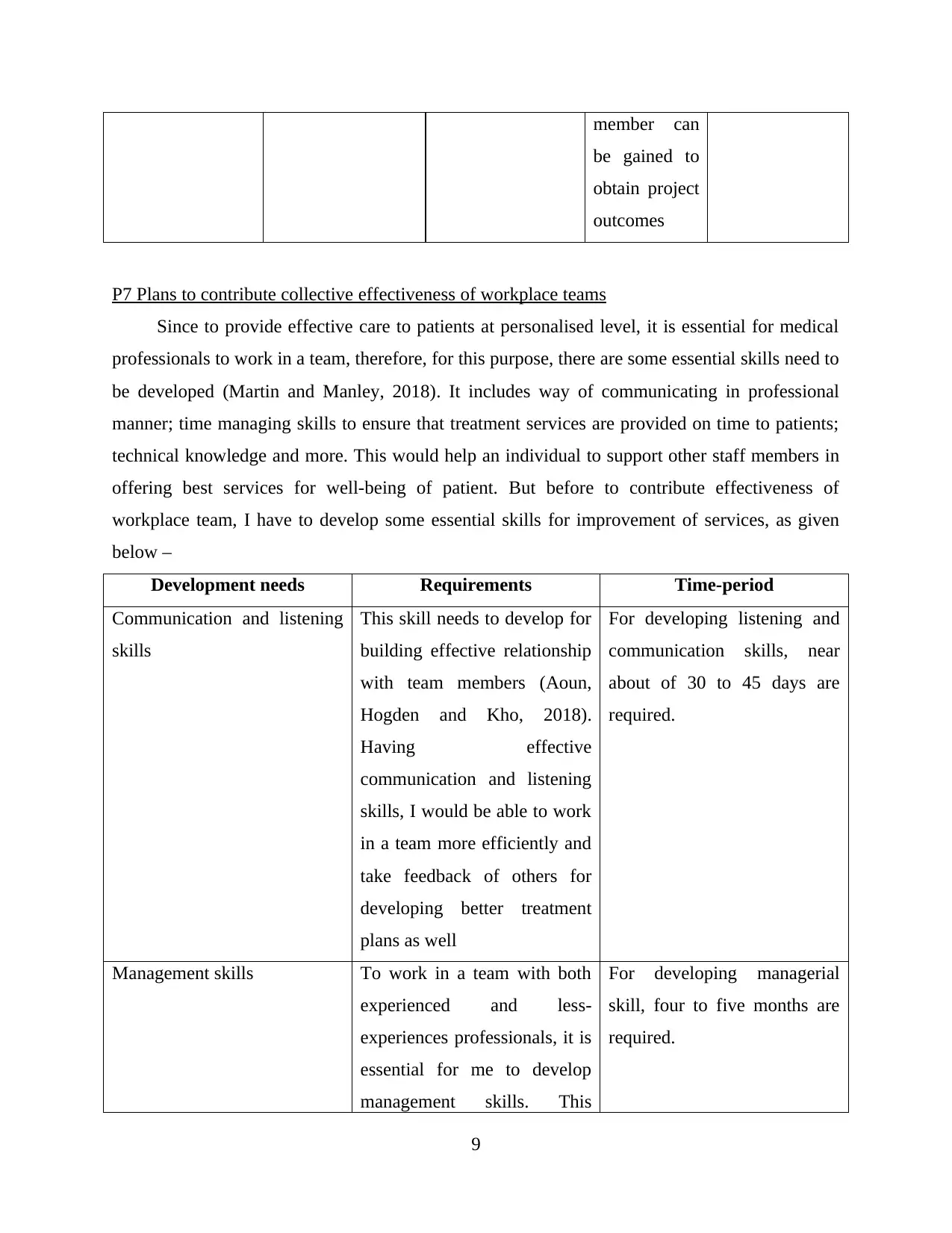
member can
be gained to
obtain project
outcomes
P7 Plans to contribute collective effectiveness of workplace teams
Since to provide effective care to patients at personalised level, it is essential for medical
professionals to work in a team, therefore, for this purpose, there are some essential skills need to
be developed (Martin and Manley, 2018). It includes way of communicating in professional
manner; time managing skills to ensure that treatment services are provided on time to patients;
technical knowledge and more. This would help an individual to support other staff members in
offering best services for well-being of patient. But before to contribute effectiveness of
workplace team, I have to develop some essential skills for improvement of services, as given
below –
Development needs Requirements Time-period
Communication and listening
skills
This skill needs to develop for
building effective relationship
with team members (Aoun,
Hogden and Kho, 2018).
Having effective
communication and listening
skills, I would be able to work
in a team more efficiently and
take feedback of others for
developing better treatment
plans as well
For developing listening and
communication skills, near
about of 30 to 45 days are
required.
Management skills To work in a team with both
experienced and less-
experiences professionals, it is
essential for me to develop
management skills. This
For developing managerial
skill, four to five months are
required.
9
be gained to
obtain project
outcomes
P7 Plans to contribute collective effectiveness of workplace teams
Since to provide effective care to patients at personalised level, it is essential for medical
professionals to work in a team, therefore, for this purpose, there are some essential skills need to
be developed (Martin and Manley, 2018). It includes way of communicating in professional
manner; time managing skills to ensure that treatment services are provided on time to patients;
technical knowledge and more. This would help an individual to support other staff members in
offering best services for well-being of patient. But before to contribute effectiveness of
workplace team, I have to develop some essential skills for improvement of services, as given
below –
Development needs Requirements Time-period
Communication and listening
skills
This skill needs to develop for
building effective relationship
with team members (Aoun,
Hogden and Kho, 2018).
Having effective
communication and listening
skills, I would be able to work
in a team more efficiently and
take feedback of others for
developing better treatment
plans as well
For developing listening and
communication skills, near
about of 30 to 45 days are
required.
Management skills To work in a team with both
experienced and less-
experiences professionals, it is
essential for me to develop
management skills. This
For developing managerial
skill, four to five months are
required.
9
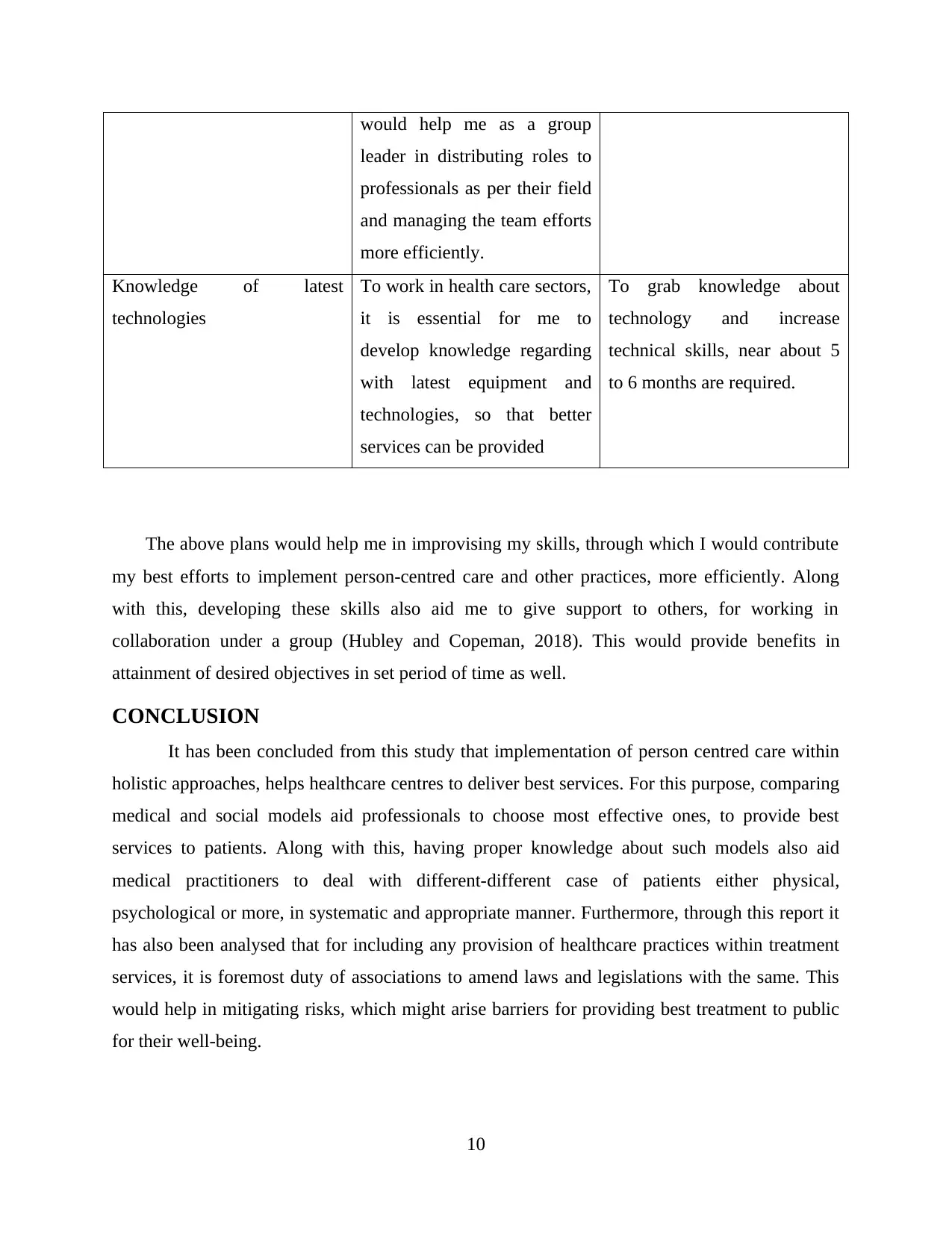
would help me as a group
leader in distributing roles to
professionals as per their field
and managing the team efforts
more efficiently.
Knowledge of latest
technologies
To work in health care sectors,
it is essential for me to
develop knowledge regarding
with latest equipment and
technologies, so that better
services can be provided
To grab knowledge about
technology and increase
technical skills, near about 5
to 6 months are required.
The above plans would help me in improvising my skills, through which I would contribute
my best efforts to implement person-centred care and other practices, more efficiently. Along
with this, developing these skills also aid me to give support to others, for working in
collaboration under a group (Hubley and Copeman, 2018). This would provide benefits in
attainment of desired objectives in set period of time as well.
CONCLUSION
It has been concluded from this study that implementation of person centred care within
holistic approaches, helps healthcare centres to deliver best services. For this purpose, comparing
medical and social models aid professionals to choose most effective ones, to provide best
services to patients. Along with this, having proper knowledge about such models also aid
medical practitioners to deal with different-different case of patients either physical,
psychological or more, in systematic and appropriate manner. Furthermore, through this report it
has also been analysed that for including any provision of healthcare practices within treatment
services, it is foremost duty of associations to amend laws and legislations with the same. This
would help in mitigating risks, which might arise barriers for providing best treatment to public
for their well-being.
10
leader in distributing roles to
professionals as per their field
and managing the team efforts
more efficiently.
Knowledge of latest
technologies
To work in health care sectors,
it is essential for me to
develop knowledge regarding
with latest equipment and
technologies, so that better
services can be provided
To grab knowledge about
technology and increase
technical skills, near about 5
to 6 months are required.
The above plans would help me in improvising my skills, through which I would contribute
my best efforts to implement person-centred care and other practices, more efficiently. Along
with this, developing these skills also aid me to give support to others, for working in
collaboration under a group (Hubley and Copeman, 2018). This would provide benefits in
attainment of desired objectives in set period of time as well.
CONCLUSION
It has been concluded from this study that implementation of person centred care within
holistic approaches, helps healthcare centres to deliver best services. For this purpose, comparing
medical and social models aid professionals to choose most effective ones, to provide best
services to patients. Along with this, having proper knowledge about such models also aid
medical practitioners to deal with different-different case of patients either physical,
psychological or more, in systematic and appropriate manner. Furthermore, through this report it
has also been analysed that for including any provision of healthcare practices within treatment
services, it is foremost duty of associations to amend laws and legislations with the same. This
would help in mitigating risks, which might arise barriers for providing best treatment to public
for their well-being.
10
⊘ This is a preview!⊘
Do you want full access?
Subscribe today to unlock all pages.

Trusted by 1+ million students worldwide
1 out of 14
Related Documents
Your All-in-One AI-Powered Toolkit for Academic Success.
+13062052269
info@desklib.com
Available 24*7 on WhatsApp / Email
![[object Object]](/_next/static/media/star-bottom.7253800d.svg)
Unlock your academic potential
Copyright © 2020–2026 A2Z Services. All Rights Reserved. Developed and managed by ZUCOL.





